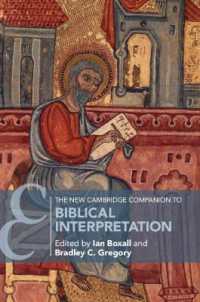- ホーム
- > 洋書
- > 英文書
- > History / World
Full Description
By 1945, both the US State Department and US Intelligence saw Czechoslovakia as the master key to the balance of power in Europe and a chessboard for the power-game between East and West. In this book, Igor Lukes illuminates the early stages of the Cold War in postwar Prague. He paints a critical portrait of Ambassador Laurence Steinhardt and shows that although Washington understood that the outcome of the crisis in Prague might shape the political trends elsewhere in Europe, it ignored signs that democracy in Czechoslovakia was in trouble. A large section of the book deals with US Intelligence in postwar Prague. The American intelligence officials who served in Czechoslovakia from 1945 to 1948 were committed to the mission of gathering information and protecting democracy. Yet they were defeated by the Czech and Soviet clandestine services that proved to be more shrewd and better informed. Indeed, Lukes reveals that a key American officer may have been turned by the Russians. Consequently, as the Communists moved to impose their dictatorship, the American Embassy was unprepared and helpless.
Contents
Acknowledgments ; Introduction. Postwar Czechoslovakia: The Master Key to Europe? ; 1. Resurrecting Czechoslovakia from its Munich Grave ; 2. General Eisenhower Declines to Liberate Prague ; 3. Spring 1945: The Americans Return to the Schonborn Palace ; 4. Ambassador Steinhardt's Delayed Arrival ; 5. A Chronicle of Wasted Opportunities ; 6. Steinhardt Encounters Reality: Nationalization, Expulsions, and U.S. Military Withdrawal ; 7. America's First Warning Signs: From the Stechovice Raid Toward the May 1946 Elections ; 8. Great Expectations and Lost Illusions: U.S. Intelligence in Postwar Prague ; 9. Passing the Point of No-Return: Prague Withdraws from the Marshall Plan ; 10. The Communists Exchange Popularity for Absolute Power ; 11. The Schonborn Palace Under Siege: Americans as " ; Notes ; Index





